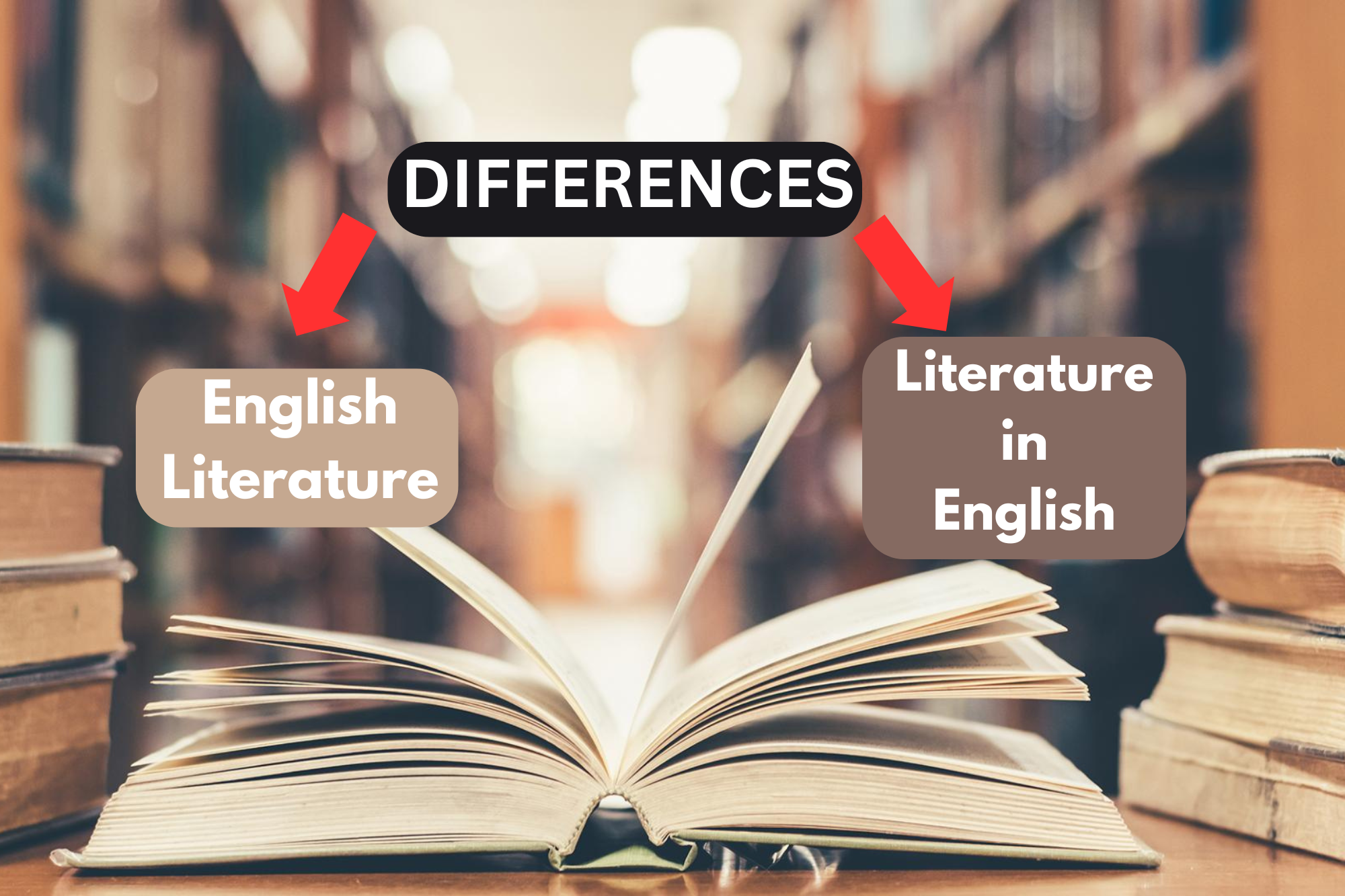Share this Post
The distinction between English Literature and Literature in English is often misunderstood, especially by students and scholars new to literary studies. While both fields involve the study of literary works, they differ in terms of scope, origin, and focus. This article explores these differences, providing a clear and comprehensive explanation.
1. Definition and Scope
English Literature
English Literature refers to literary works that originate from English-speaking countries, particularly those where English is the native language. This includes:
- British Literature (e.g., works by William Shakespeare, Charles Dickens, and Jane Austen)
- American Literature (e.g., works by Mark Twain, Emily Dickinson, and Toni Morrison)
- Australian and Canadian Literature (e.g., works by Patrick White, Margaret Atwood)
English Literature covers different periods, including:
- Old English (e.g., Beowulf)
- Middle English (e.g., Geoffrey Chaucer’s The Canterbury Tales)
- Renaissance (e.g., William Shakespeare’s Hamlet)
- Modern Literature (e.g., George Orwell’s 1984)
Literature in English
Literature in English, on the other hand, refers to literary works written in the English language by authors from various parts of the world, including those where English is not the native language. This category includes writers from Africa, Asia, the Caribbean, and other regions that may have adopted English due to colonial influence.
Examples of Literature in English include:
- Chinua Achebe’s Things Fall Apart (Nigeria)
- Ngũgĩ wa Thiong’o’s Petals of Blood (Kenya)
- Wole Soyinka’s The Man Died (Nigeria)
- Arundhati Roy’s The God of Small Things (India)
- Derek Walcott’s Omeros (Saint Lucia)
2. Origin and Cultural Influence
English Literature
English Literature is deeply rooted in the history and culture of native English-speaking countries. It reflects the traditions, beliefs, and historical experiences of societies such as Britain and America. Many classic works in English Literature have played a role in shaping Western thought and philosophy.
For example, the works of William Shakespeare are central to British literary tradition, while novels like The Great Gatsby by F. Scott Fitzgerald capture the American Dream and societal changes in the early 20th century.
Literature in English
Literature in English, by contrast, is influenced by diverse cultural backgrounds and historical experiences. It often explores themes such as colonialism, identity, tradition, and resistance against oppression.
African writers, for instance, use English to express the realities of their societies while incorporating native traditions. Chinua Achebe’s Things Fall Apart is a prime example, using English to narrate the Igbo people’s pre-colonial lifestyle and the impact of European colonization.
3. Themes and Subject Matter
English Literature
The themes in English Literature have evolved over time but often focus on:
- Human nature and philosophy (Hamlet, Frankenstein)
- Social and political issues (1984, Pride and Prejudice)
- Exploration of personal struggles (Jane Eyre, The Catcher in the Rye)
Literature in English
Literature in English, due to its global nature, tends to cover:
- Post-colonial struggles (A Grain of Wheat by Ngũgĩ wa Thiong’o)
- Cultural identity and hybridity (Season of Migration to the North by Tayeb Salih)
- Resistance against oppression (So Long a Letter by Mariama Bâ)
4. Language and Style
English Literature
English Literature is written in the standard forms of the English language as used in native-speaking countries. The language style can be complex, especially in older works like those of Shakespeare, where Early Modern English is used.
Literature in English
In Literature in English, authors sometimes infuse local dialects, proverbs, and cultural expressions into their writing. This makes their works unique, blending English with indigenous linguistic elements.
For example, Achebe’s Things Fall Apart uses Igbo proverbs to enhance storytelling:
“Proverbs are the palm oil with which words are eaten.”
5. Academic Study and Classification
English Literature
- Studied mainly as part of Western literary tradition
- Covers classic and contemporary works from native English-speaking authors
- Focuses on literary analysis, historical context, and stylistic evaluation
Literature in English
- Studied in post-colonial and global literary contexts
- Includes a broader range of voices and cultural narratives
- Explores how non-native English writers use language to express identity and history
Conclusion
The key difference between English Literature and Literature in English lies in their scope and origin. English Literature is limited to works from native English-speaking countries, while Literature in English includes works from non-native English-speaking regions but written in English.
Both fields are valuable for understanding different cultures, histories, and human experiences, with English Literature rooted in Western traditions and Literature in English offering a global perspective.
By recognizing these differences, students and scholars can better appreciate the richness of literary studies and explore diverse narratives beyond the Western literary canon.
FAQs on the Difference Between English Literature and Literature in English
Why is English Literature different from Literature in English?
English Literature refers to literary works written by authors from native English-speaking countries such as the UK, USA, Canada, and Australia. Literature in English, on the other hand, includes works written in English by authors from non-native English-speaking regions like Africa, Asia, and the Caribbean.
Can a Nigerian writer’s work be classified as English Literature?
No, a Nigerian writer’s work is typically classified under Literature in English because it originates from a non-native English-speaking country, even if it is written entirely in English.
What are some common themes in Literature in English?
Literature in English often explores themes such as colonialism, cultural identity, resistance against oppression, tradition vs. modernity, and post-colonial struggles. Examples include Things Fall Apart by Chinua Achebe and A Grain of Wheat by Ngũgĩ wa Thiong’o.
Do universities differentiate between English Literature and Literature in English?
Yes, universities worldwide categorize these fields separately. English Literature programs typically focus on British, American, and other native English literary traditions, while Literature in English programs explore post-colonial, African, Caribbean, and Asian literary works written in English.
Can Literature in English include works translated from native languages?
No, Literature in English must be originally written in English. Works that are translated from native languages, such as The Epic of Sundiata or God’s Bits of Wood, do not qualify as Literature in English unless the original version was in English.





